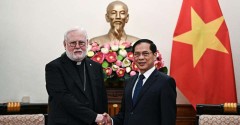
NEWSLETTERS
What’s happening in Asian Church
and what does it mean for the
rest of the world?
Updated: October 27, 2023 12:35 PM GMT

Activists with the North Korean Freedom Coalition hold up signs during a demonstration calling on Chinese President Xi Jinping to 'allow safe passage to North Koreans detained in China' across the street from the Chinese embassy in Washington, DC on Sept. 24, 2021. (Photo: AFP)
Six weeks ago I was in Seoul, moderating a panel at a conference to mark the 10th anniversary of the establishment of the United Nations Commission of Inquiry into human rights in North Korea.
We were discussing the question: where does the North Korean human rights movement go from here? How do we ensure accountability for the crimes against humanity the inquiry chaired by Australian judge Justice Michael Kirby found a decade ago? How do we make sure that his report does not simply sit on a shelf, as a historical document or an academic text, gathering dust?
One of the major, immediate issues drawn to my attention during my week in Seoul was the impending repatriation of hundreds, perhaps thousands, of North Korean escapees from China to a certain fate of torture, imprisonment, and possible death in North Korea.
I was told that there were at least 2,000 North Koreans who had been held in detention in China throughout the Covid-19 pandemic. Due to Pyongyang’s decision to seal the border for most of the past three years, the Chinese authorities could not send them until now.
However, since North Korea reopened its international borders on Aug. 26, China was now preparing to send these detainees back.
A month later, the nightmare began. In recent weeks, at least 600 North Koreans have reportedly been sent back from China in violation of international law and to a justifiable outcry from the international community.
"Repatriated North Korean refugees are treated as ‘criminals’ or ‘traitors,’ and 'face harsh punishments under charges of treason'"
A group of United Nations experts, led by the Special Rapporteur on Human Rights in North Korea Elizabeth Salmon have urged China to consider alternative solutions to the forced repatriation of North Koreans, “the vast majority of whom are women.”
The UK’s All Party Parliamentary Group (APPG) on North Korea also condemned forcible repatriations, noting that “most of them were women, children, and even newborn babies, who now face the severe risks of imprisonment, torture, detention in prison camps, and even execution.”
In a statement, the APPG noted that in the eyes of Kim Jong-Un’s regime, “the repatriated North Korean refugees are treated as ‘criminals’ or ‘traitors,’” and “face harsh punishments under charges of treason if they are found to have any connections with Westerners, missionaries, churches, or intended to go to the Republic of Korea.”
The punishments may involve “imprisonment without legal process, enforced disappearances, detention in prison camps for life, and even execution.”
The UN experts and the APPG have strongly urged China to cease its policy of forcible repatriation and uphold international law by abiding by the principle of non-refoulement of refugees. China should fulfill its obligations under the 1951 Refugee Convention by facilitating a safe passage for refugees to transit through third countries and finally reach South Korea.
This crisis comes just as the UN Special Rapporteur has published her latest report on North Korea, in which she urges Kim Jong-Un’s regime, among other things, to “recognize the fundamental right to leave and enter the country, both in law and in practice, and ensure that those who are repatriated are not subjected to punishment upon repatriation.”
Human rights groups in Seoul have urged South Korea’s President Yoon Suk Yeol to do more to try to press China to stop these repatriations. Their protests are welcome and right.
"There is a real danger that the crimes against humanity in North Korea will get pushed to one side"
But let’s be clear: the culprit here is China. A regime that already commits so many crimes against humanity and other atrocious crimes against its own people is now facilitating and complicit with atrocities against innocent civilians escaping from a neighboring authoritarian regime.
If it does not change that policy, then one day Beijing should stand in the dock alongside Pyongyang. One day, both Xi Jinping and Kim Jong-Un should face their day in court.
In a world seemingly filled with daily crisis — from Israel and Gaza to Ukraine, from Myanmar to the ongoing atrocities by China against the Uyghurs and Tibetans, from the crisis in the tiny Armenian enclave of Nagorno Karabakh to the strangulation of Hong Kong’s freedoms and autonomy and beyond — there is a real danger that the crimes against humanity in North Korea will get pushed to one side and that the world will turn a blind eye to the forcible repatriation of North Koreans from China. But we must not let that happen.
The international community should take the Commission of Inquiry’s report off the shelf, dust it off, re-read it, and work out what its action plan should be.
The report may be ten years old, but in many ways, North Korea is like a silent black-and-white movie, slow-moving and almost frozen in time, and so the report is as relevant today as it was a decade ago.
If updates and a refresh are needed, human rights organizations focused on North Korea can provide them.
The international community must read the current UN Special Rapporteur’s report carefully, and the statement she led with other UN experts, and act to stop the repatriation of North Koreans sent back to near-certain rape, sexual violence, slave labor, torture, and death.
The international community must learn, in this era of emergencies, to multi-task. Israel and Gaza understandably demand our attention. But Ukraine cannot afford to lose our support. And the world’s other festering tragedies — in Myanmar, across China, in North Korea and beyond — deserve our efforts too.
Right now, let’s do everything possible to save as many lives as possible by doing as much as possible to stop China’s forced repatriation of North Koreans.
*The views expressed in this article are those of the author and do not necessarily reflect the official editorial position of UCA News.
















